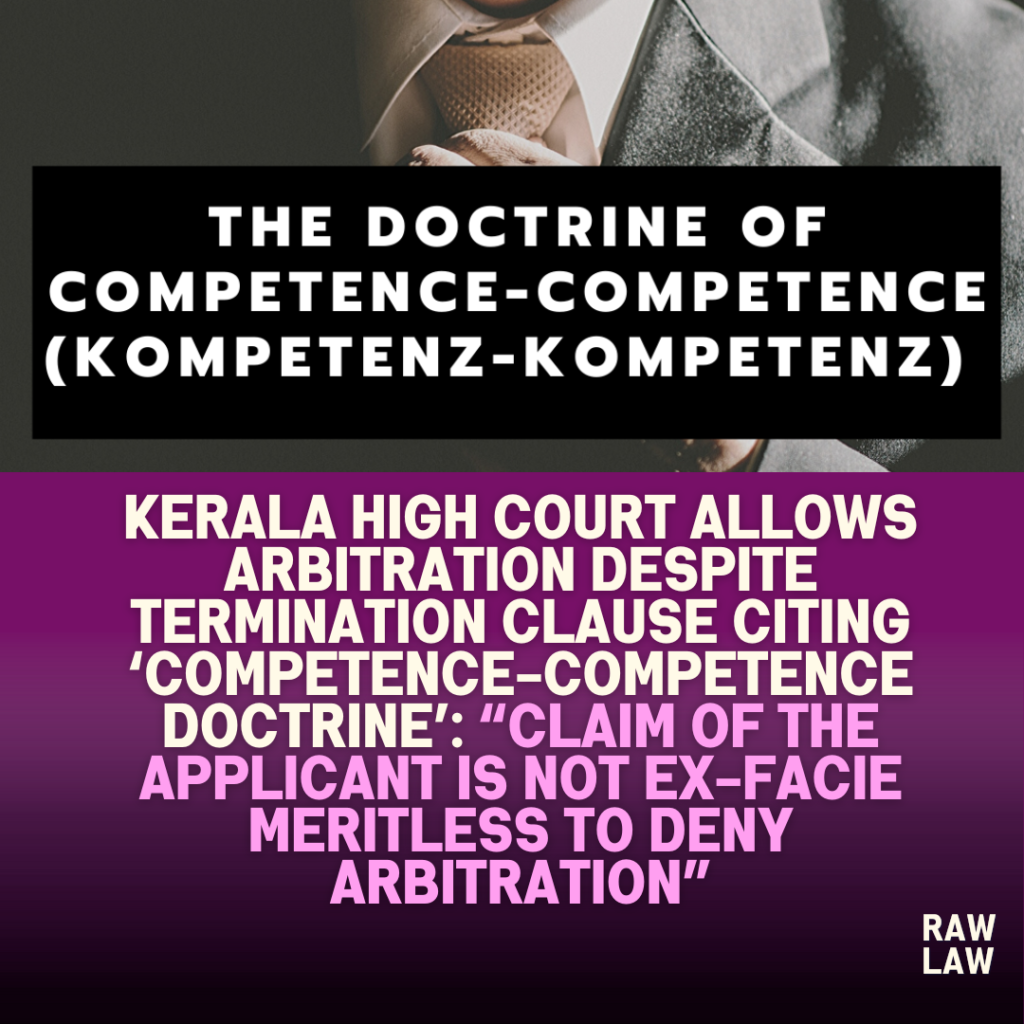Court’s Decision
The Kerala High Court allowed a petition under Section 11(6) of the Arbitration and Conciliation Act, 1996, for appointment of an arbitrator in a dispute arising from an Investment Agreement for the purchase of 100% equity in a hospital. The Court held that even if the agreement contained an automatic termination clause, the issue of whether the agreement subsisted was a matter for the arbitrator to decide. It appointed Justice N.K. Balakrishnan (Retd.) as the sole arbitrator to resolve the dispute.
Facts
The applicant had entered into an Investment Agreement dated 27.10.2024 with respondents 1 to 3 for purchasing 100% equity shares of a hospital company for ₹170 crores, of which ₹30 crores was to be paid in advance via cheque. The agreement stipulated automatic termination if the cheque was dishonoured or the payment was not made. The applicant issued a cheque dated 27.10.2024 but it was not presented for encashment. Respondents claimed they did not deposit the cheque due to the applicant’s instruction citing insufficient funds.
On 30.10.2024, respondents 1 to 3 entered into a Business Transfer Agreement with the 4th respondent hospital. The applicant moved the Munsiff Court for injunction, which was later vacated. A Section 9 application for interim relief was also dismissed by the Commercial Court, observing that the applicant failed to establish a prima facie case.
Subsequently, the applicant filed the present petition under Section 11 for appointment of an arbitrator, also impleading the 4th respondent on the ground that it was an assignee.
Issues
- Whether the Investment Agreement dated 27.10.2024 was still subsisting to invoke the arbitration clause?
- Whether the 4th respondent, not a signatory to the agreement, was a necessary or proper party to the arbitration proceedings?
Petitioner’s Arguments
The petitioner argued that:
- The arbitration clause in the agreement survives termination.
- The 4th respondent, though not a signatory, is bound as an assignee.
- The arbitration notice issued to respondents 1 to 3 sufficed as notice to the 4th respondent.
- Cited precedents including Cox and Kings II, Interplay judgment, and High Court decisions supporting arbitration even with non-signatories.
Respondents’ Arguments
Respondents 1 to 3 contended:
- The agreement stood terminated due to failure to pay advance; hence, arbitration cannot be invoked.
- The cheque was not honoured and the agreement ceased to exist.
- The Section 9 Commercial Court order found the agreement terminated and the petitioner’s claim meritless.
The 4th respondent argued:
- It was not a party or permitted assignee under the agreement.
- It did not receive notice under Section 21 or 11(5) of the Act.
- Arbitration proceedings against it were not maintainable.
- Relied on Arif Azim, Cox and Kings I, SBI General Insurance, and Ajay Madhusudan Patel.
Analysis of the Law
The Court applied the doctrine of “Competence-Competence” from Interplay and held that the arbitral tribunal has the authority to decide on the existence or termination of the underlying contract. It held that the arbitration clause remains valid despite contract termination and that disputed facts like cheque dishonour or termination are matters for the arbitrator.
On the issue of impleading the 4th respondent, the Court referred to Cox and Kings I & II and held that inclusion of non-signatories at the referral stage requires a prima facie evaluation. Since no arbitration notice was served to the 4th respondent, the Court held the request against the 4th respondent was premature and unsustainable.
Precedent Analysis
- Interplay Between Arbitration and Stamp Act (2024) – Upheld separability and competence-competence doctrines.
- Cox and Kings II (2025) 1 SCC 611 – Arbitrator to determine complex questions regarding non-signatories.
- Radha Madhavi (Hyderabad HC) – Distinguished as it dealt with automatic termination due to time lapse, unlike the current case involving cheque dishonour.
- Ajay Madhusudan Patel (2025) – Reaffirmed minimal scrutiny under Section 11(6).
- Nirmala Jain (Delhi HC), Basant Kumar Khemka (Calcutta HC), Devtree Corp. LLP (Karnataka HC) – Supported binding non-signatories where composite transactions or privity exists.
Court’s Reasoning
The Court reasoned that:
- Whether the agreement is terminated is a disputed fact, and the arbitrator has jurisdiction to determine such issues.
- Findings in Section 9 proceedings are only prima facie and not binding under Section 11.
- The applicant’s reference to payment via cheque did not amount to misrepresentation.
- The arbitration clause survives the agreement’s termination.
- As no notice was issued to the 4th respondent, arbitration against it could not be maintained.
Conclusion
The Court allowed the arbitration request:
- Appointed Justice N.K. Balakrishnan (Retd.) as sole arbitrator for disputes between the applicant and respondents 1 to 3.
- Held all issues including jurisdiction and limitation are open before the arbitrator.
- Excluded the 4th respondent from proceedings due to absence of notice and lack of prima facie evidence of being a ‘veritable party’.
Implications
- Reinforces the principle that arbitration clauses survive termination of contract.
- Confirms limited role of courts under Section 11; disputes on contract subsistence must be left to arbitrators.
- Sets a high threshold for including non-signatories in arbitration without notice.
- Provides clarity on interplay between Section 9 and Section 11 findings.
FAQs
Q1. Can arbitration be initiated after the termination of a contract?
Yes. Courts have repeatedly held that arbitration clauses survive termination and the arbitrator can decide issues related to the contract’s subsistence.
Q2. Is it mandatory to serve arbitration notice to a non-signatory party?
Yes. Under Section 21 and Section 11(5) of the Act, formal notice is mandatory. Non-signatories cannot be dragged into arbitration without notice.
Q3. Does a court’s finding under Section 9 bar arbitration under Section 11?
No. Findings under Section 9 are only prima facie and cannot be relied upon to reject an arbitration petition under Section 11.
